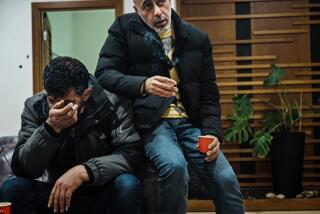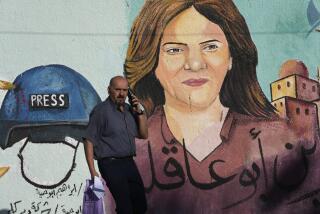Iraqi reporter risks it all for the story
- Share via
Reporting from Baghdad — It is another broiling morning in Iraq’s capital as TV reporter Falah Azzawi, decked out in ketchup-colored shirt and tie, enters an alleyway with his microphone.
People of all ages follow the bleached platinum-haired man as if he’s the Pied Piper. “Falah, tell the government we need power,” they shout.
Azzawi’s trusty cameraman, Nadhem, follows as well, huffing as his boss strides up the alleyway. Azzawi barks at Nadhem constantly: “Film the generator wires, film the sewage, film the garbage.”
The rotund videographer, oozing sweat, pans his camera.
As America begins to draw down its troops seven years after the invasion of Iraq, Azzawi represents the grittiest of the country’s reporters. Every week, he tours Iraq, hunting down corruption and hectoring officials about their shortcomings. His program, “Among the People,” is broadcast on a small independent channel called Al Diyar. People greet him by name and he receives up to 50 letters a day.
Defying the 120-degree heat, he saunters into the alley’s restaurant and barbershop — part talk-show host, part rabble-rouser but always sentimental. “OK, I’m in Shukr Gahawa,” he tells the viewer. “There hasn’t been power here in seven days, OK?” Azzawi barks his words, then dabs his face with a silky red handkerchief. He protects his eyes with Bono-style black sunglasses.
Azzawi often delivers off-the-cuff commentary on whatever is on his mind. Now he begs the restaurant chef to fry him an egg.
“If someone doesn’t want to cook, they say let us bring food from Abu Yusf’s restaurant,” Azzawi says, smiling. Nervous, the chef burns the food.
“No problem. Take it easy,” Azzawi reassures him and speaks to the camera. “Nadhem, film the details of how he is cooking and working.”
Azzawi doesn’t mince words as he demonstrates the gap between Iraq’s rulers and its ordinary citizens. He provides a platform where Iraqis can roar against the sometimes dubious actions of their elected and appointed officials.
He has also managed to stay alive despite infuriating the powerful. That’s no small feat in Iraq.
At least 139 journalists have been killed here since 2003. Last year, gunmen shot and wounded a colleague of Azzawi’s who had criticized relatives of government officials, and a female news presenter from the state channel Al Iraqiya was assaulted on the street, for mysterious reasons.
Azzawi has learned to cajole and sweet talk. He often coaxes public figures into assisting with cases he brings to their attention. He has fashioned himself into a direct line from the Green Zone’s bunkered officials to the slums of Baghdad.
He has even nurtured a friendship with the head of the Baghdad provincial council, Kamil Zaidi, to whom he presents citizen complaints. His phone brims with the numbers of influential military commanders and politicians. He relishes the pictures on his cellphone of leaders he has interviewed, and he can’t resist recounting the sarcastic barbs he aimed at them.
One photo is of Vice President Tariq Hashimi, a Sunni Arab, laughing and slapping him on the arm, and another is of Shiite religious and political figure Ammar Hakim, smiling. Both men look respectful but slightly nervous, perhaps wary of what might pop out of Azzawi’s mouth.
Azzawi talks of getting services restored in neighborhoods. He claims he has exposed a powerful army officer who was stealing his soldiers’ salaries. But the limits of what he can do are constantly shifting.
The government’s Communications and Media Commission has been pushing to regulate television stations, and wants the right to shutter channels judged to be inciting violence. The definition of incitement is not clear — which makes Iraqi journalists nervous that this may be a move to curb free speech.
Censorship is nothing new to Azzawi. He learned his trade on Shabab TV and radio channels under the autocratic regime of Saddam Hussein. The stations, opened by Hussein’s son Uday, catered to young Iraqis with a steady diet of hip Western and Arab movies, music and more freewheeling criticism of authorities than had been tolerated before. Azzawi, now 48, joined as a radio announcer in the mid-1990s.
Much of what he has accomplished in the years since he attributes to his own pluck and survival instinct.
When he started his current show in 2004, he broadcast live from Sadr City, the vast Shiite Baghdad slum where U.S. forces and Shiite militias often clashed. “You couldn’t work anywhere for an hour. There were snipers, terrorists and fear,” he says. “We faced many incidents, but praise God, the love of the people protected us.”
It was a harrowing stop at an Al Qaeda checkpoint in Diyala province in 2007 that made Azzawi realize that his reputation for giving voice to the voiceless had spread far beyond his own expectations. He assumed he’d be killed by the men at the checkpoint. But then the face of the group’s leader flickered with recognition. He ordered him to leave but not before whispering that he was a fan.
On his tour of Shukr Gahawa, Azzawi says, “Salaam, shakoo shabab? (What’s up, guys?)” to a few unemployed men. Then he faces the camera and asks why the city hasn’t repaired a fallen power cable. “Maintenance workers can do it but they tell you they want money,” he says, spitting the words into his microphone.
As he waxes about injustice, he rambles. He wonders about the address of a goalie from an old Iraqi national soccer team who lived in the neighborhood. He moons over the beauty of old Baghdad houses. He interviews a baker about the scorching heat, and when he samples the bread, he talks with his mouth full.
He spots a woman in her 70s and sits with her on her stoop, calling her by the honorary name Hajiya. He asks: “What was Iraq’s best period?”
“The monarchy,” she says.
This era, she says, is the worst in Iraq’s modern history.
He begs her: “Hajiya, what are the solutions? The simple solutions?”
“I don’t know,” she says. “They are fighting for posts and they have gangs and they are planting bombs. They are killing each other and fighting each other and getting the money and taking it out of the country.”
He asks: “Nothing has changed?”
“Nothing will change. Where is the electricity? Everyone talks, but what have they done?” she says.
As if to cheer her up, Azzawi insists: “They will listen.”
Some in the neighborhood watch him with fondness. Many think he is both brave and foolish. Surely he will have to stop when U.S. forces leave Iraq, people whisper. Muckrakers like him will be muzzled.
“We love anyone who is faithful to us, who translates the people’s suffering,” says one alleyway resident, Abu Abdullah, as he watches Azzawi interview men in a coffeehouse. “But it is dangerous…. That is why the faithful journalists are targeted.”
On camera, Azzawi leaves it to ordinary citizens to deliver the most biting remarks. Several lawsuits brought by officials have been dismissed because the judge agreed that Azzawi was simply reporting people’s opinions.
Al Diyar’s station manager, Omar Yasseri, thinks Azzawi’s talents have made him nearly untouchable. “When you watch this show and listen to Falah talk, you will say what he says is correct! Falah talks in a way as if he is suffering from that problem!” Yasseri says.
Fellow Al Diyar broadcaster Imad Abadi, shot in the head last November by unknown gunmen shortly after accusing the prime minister’s relatives of corruption, also admires his colleague.
“Sure, he became close to some officials, to some decision makers. He has certain influence with them to make them do something,” Abadi says. “He manages to balance things.”
Back at his office, a modest villa along the Tigris River, Azzawi lies back on a raggedy couch, sipping a cola. He laughs when asked if he is worried about the future. He boasts that the people’s love will protect him. If private militias return, he may slow down, he says, but he vows to never stop.
In the meantime, he will keep crossing the country, talking fast and exposing the dark side.
He tells himself he has stayed honest and true. He is beholden to no one.
More to Read
Sign up for Essential California
The most important California stories and recommendations in your inbox every morning.
You may occasionally receive promotional content from the Los Angeles Times.
![LOS ANGELES, CA - JUNE 17: [Cody Ma and Misha Sesar share a few dishes from their Persian Restaurant Azizam] on Monday, June 17, 2024 in Los Angeles, CA. (Ethan Benavidez / For The Times)](https://ca-times.brightspotcdn.com/dims4/default/7ffc7f6/2147483647/strip/true/crop/5110x3417+306+0/resize/320x214!/quality/75/?url=https%3A%2F%2Fcalifornia-times-brightspot.s3.amazonaws.com%2F79%2Fdc%2F4d29255545f5b9813315901692bc%2F1459972-fo-azizam-review20-eba.JPG)












